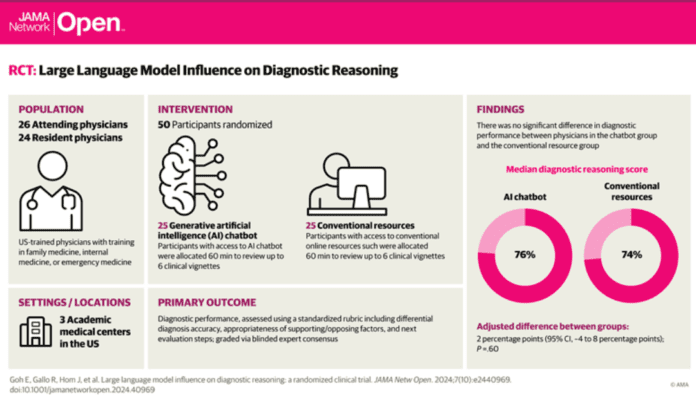A recent study has sent shockwaves through the medical community, revealing that ChatGPT, an AI language model, surpassed human physicians in diagnosing medical conditions based on case histories. The study, which involved doctors using ChatGPT alongside traditional resources, found that the AI achieved an impressive 90% accuracy in diagnosing conditions and explaining its reasoning, while physicians scored an average of 76% with the chatbot and 74% without it.
The AI Advantage
A study led by Dr. Adam Rodman (Harvard Medical School profile), an esteemed U.S. expert in internal medicine at Beth Israel Deaconess Medical Center, investigated the potential benefits of chatbots for doctors in identifying illnesses. The experiment involved 50 doctors, a mix of residents and attending physicians recruited through a few large American hospital systems.
This finding is particularly intriguing because ChatGPT outperformed doctors even when they had access to the AI tool themselves. Dr. Adam Rodman, a contributor to the study, noted that many physicians were resistant to the chatbot’s suggestions, especially when they conflicted with their own diagnoses. This raises questions about the potential biases and overconfidence that may hinder medical professionals from fully leveraging AI assistance.
A Broader Perspective
This study isn’t an isolated incident. Earlier research published in JAMA Internal Medicine found that ChatGPT‘s responses to patient questions were preferred by healthcare professionals 79% of the time, citing higher quality and more empathetic answers compared to human physicians.
The Kennedy Factor
In light of these developments, it’s worth considering the perspective of Robert F. Kennedy Jr., the recently nominated U.S. Secretary of Health and Human Services. The “anti-vaxxer” Kennedy, known for his skepticism towards established medical practices, Kennedy has consistently questioned the reliability of medical professionals and institutions. How might his views on the medical establishment be influenced by studies showing AI outperforming human doctors? Could this fuel further distrust in traditional healthcare systems?
Looking Ahead
As AI continues to make strides in medical diagnosis and patient communication, we must ask ourselves: Are we on the cusp of a healthcare revolution? Will AI become an indispensable tool for doctors, or could it potentially replace certain aspects of human medical expertise?
While the potential benefits of AI in healthcare are immense, including improved diagnosis accuracy and more empathetic patient interactions, we must also consider the ethical implications and potential risks of over-reliance on technology. As we move forward, striking a balance between human expertise and AI assistance will be crucial in shaping the future of healthcare.
In my opinion, the future of healthcare lies in a symbiotic relationship between AI and human medical professionals. AI tools like ChatGPT have the potential to augment and enhance medical decision-making, but they should not replace the nuanced understanding and empathy that skilled physicians bring to patient care. The challenge ahead is to integrate these technologies responsibly, ensuring that they complement rather than supplant human expertise, ultimately leading to better health outcomes for all.





